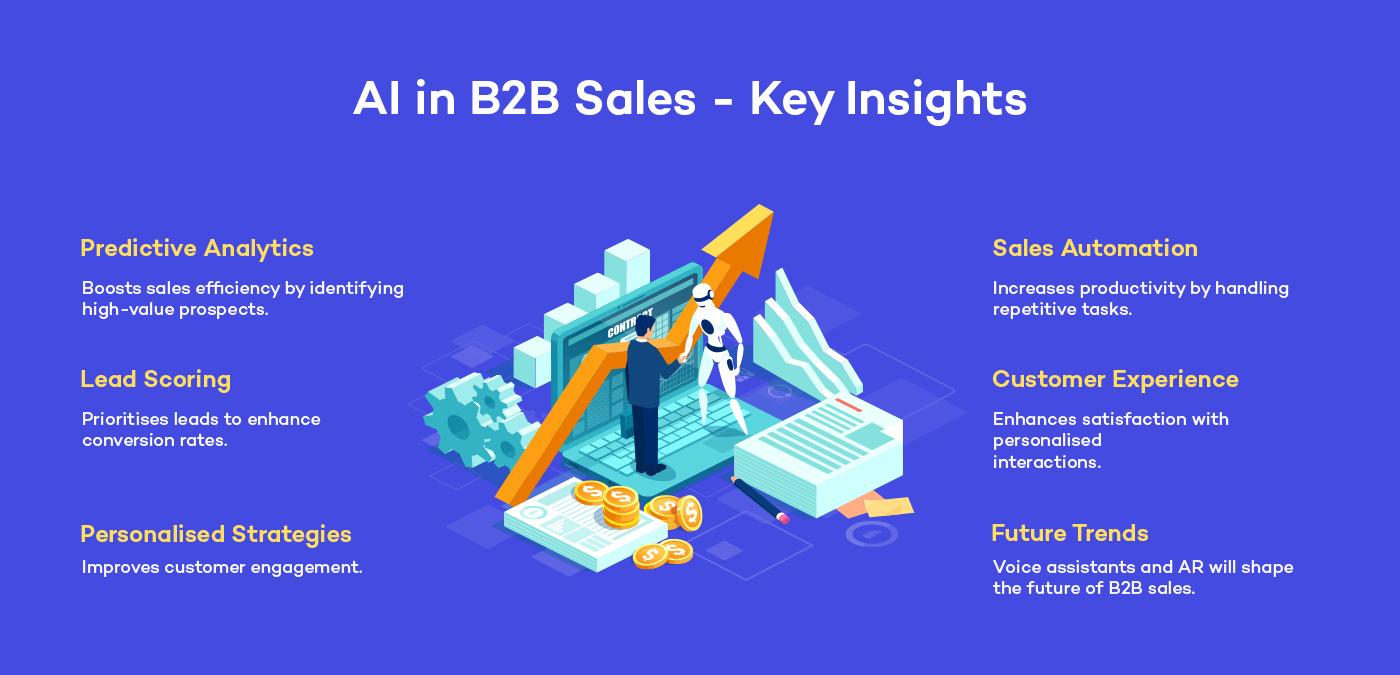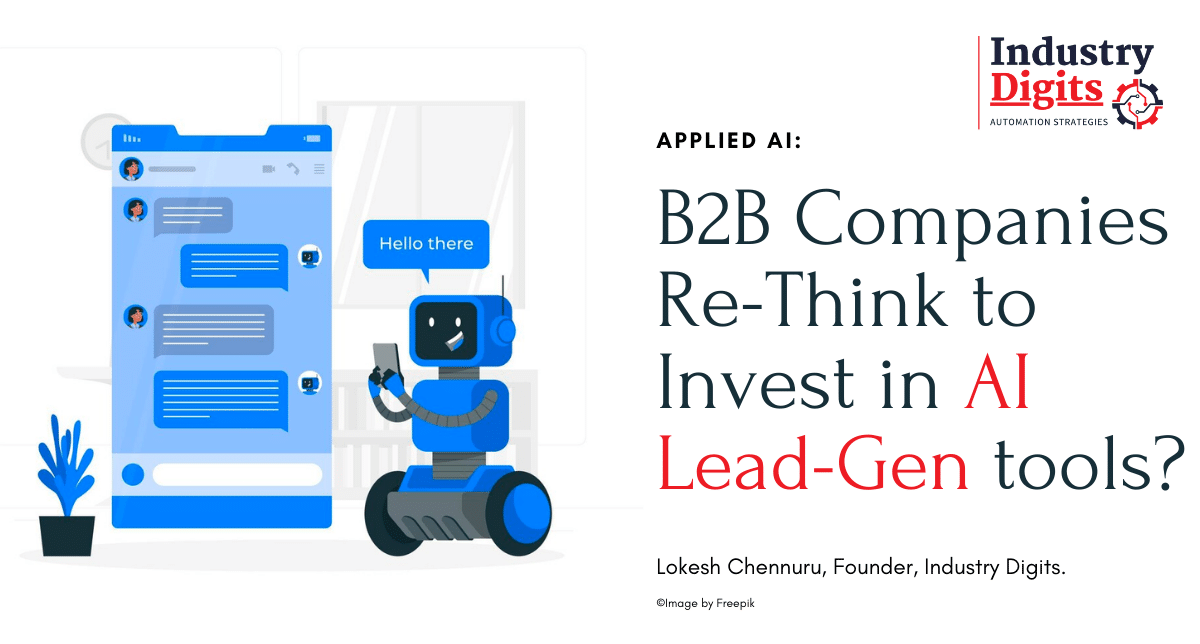AI Automation for B2B: Methods to Enhance Your Organization Efficiency
AI automation in the B2B field provides a critical opportunity for organizations to boost their efficiency. By enhancing processes and boosting decision-making, companies can achieve substantial effectiveness. Nonetheless, the effective combination of AI calls for careful factor to consider of numerous aspects. Understanding which areas to automate and choosing ideal tools are simply the beginning. The capacity for makeover elevates important questions regarding application and ongoing examination. What strategies will guarantee long lasting success in this progressing landscape?
Recognizing AI Automation in B2B Context
As companies significantly look for performance and development, comprehending AI automation in the B2B context ends up being essential. AI automation leverages sophisticated technologies to improve procedures, boost decision-making, and improve overall productivity. By incorporating AI tools, business can maximize procedures such as supply chain administration, client partnership administration, and data evaluation. These innovations can analyze substantial amounts of data quickly, providing actionable understandings that drive strategic campaigns. In addition, AI-driven automation decreases human mistake and liberates staff members to concentrate on more complex tasks. By cultivating partnership between human intelligence and maker capacities, companies can achieve a competitive edge. Eventually, recognizing AI automation is crucial for B2B companies intending to flourish in an increasingly electronic market.
Recognizing Locations for Automation
In the pursuit for reliable AI automation in B2B, it is important to identify details areas where automation can produce substantial advantages. This includes assessing job monotone, discovering chances for information handling, and identifying workflow traffic jams. By concentrating on these aspects, organizations can streamline procedures and enhance performance.
Task Monotone Evaluation
Job repetitiveness analysis plays a necessary role in recognizing locations ripe for automation within B2B procedures. This procedure involves examining daily jobs to identify which are time-consuming and repeated, thereby impeding productivity. By inspecting workflows, organizations can determine details functions that need too much manual input, such as information access, invoice handling, or client follow-ups. Acknowledging these repeated jobs allows companies to allot sources better, enhancing general effectiveness (Growth Systems For B2B). Additionally, automation can decrease human error, simplify operations, and complimentary up staff members to focus on higher-value tasks. Performing a thorough job repetitiveness assessment empowers B2B organizations to take on targeted automation strategies, eventually driving enhanced efficiency and affordable benefit in the industry
Information Handling Opportunities
Numerous information processing chances exist within B2B organizations, providing substantial potential for automation. These possibilities frequently develop in areas such as data access, billing handling, and client connection management. By automating data collection and validation procedures, organizations can reduce human error and boost efficiency. Additionally, automating report generation permits teams to access real-time insights, cultivating prompt decision-making. Supply administration systems can likewise benefit from automation, enhancing supply tracking and order handling. Leveraging AI in data analytics enables organizations to reveal fads and patterns that may or else go undetected. Inevitably, accepting automation in these areas not just enhances operations yet likewise liberates important sources, permitting workers to concentrate on strategic efforts that drive growth.
Operations Bottleneck Recognition
Determining process traffic jams is a crucial action in recognizing the complete advantages of automation within B2B organizations. These traffic jams typically manifest as hold-ups, resource restrictions, or inefficient procedures that hinder efficiency. To successfully pinpoint these locations, organizations can conduct complete analyses of their workflows, making use of metrics such as cycle time and throughput. Engaging staff members in discussions regarding discomfort factors can also supply important understandings. Once bottlenecks are recognized, organizations can prioritize them based on influence and expediency for automation. By strategically resolving these ineffectiveness, B2B business can improve procedures, boost collaboration, and eventually boost total performance. This positive strategy to operations assessment lays the foundation for effective automation campaigns that drive organization development.
Choosing the Right AI Equipment and Technologies
As organizations progressively transform to AI to boost their procedures, selecting the right tools and innovations ends up being crucial for attaining desired results. Organizations needs to evaluate their specific needs and goals, taking into consideration aspects such as compatibility, scalability, and user-friendliness. An extensive market evaluation can assist identify leading AI options customized for their market. Furthermore, companies need to analyze the technical infrastructure required to sustain these devices, making sure seamless combination with existing systems. Data protection and conformity with laws are likewise vital considerations that influence device choice. By concentrating on these standards, firms can make enlightened decisions that drive efficiency and performance, eventually resulting in boosted service performance. The appropriate AI devices equip companies to innovate and maintain an one-upmanship on the market.
Developing a Critical Application Plan
An effective strategic application plan for AI automation in B2B needs plainly defined vital objectives. Minarik AI. Furthermore, organizations should assess their present capabilities to determine gaps and chances for enhancement. Continuous monitoring and change of the method will certainly ensure alignment with progressing organization needs and innovation innovations
Specify Key Objectives
To guarantee effective AI automation in B2B environments, specifying vital objectives is necessary for establishing a strategic execution strategy. Organizations should recognize particular, measurable objectives that align with their general company strategy. This clearness gives a roadmap for the automation process, ensuring that initiatives are focused on locations that will produce the greatest effect. Trick purposes may consist of boosting operational performance, enhancing client fulfillment, or increasing profits. Establishing these objectives allows groups to prioritize resources successfully and track progress in time. In addition, clear objectives promote better communication amongst stakeholders, cultivating partnership and positioning throughout the company. Inevitably, distinct objectives work as the foundation for a robust AI automation approach that drives company performance.
Evaluate Present Capacities

Screen and Adjust
Implementing AI automation calls for a dynamic technique that highlights continuous surveillance and modification - Minarik AI. Companies have to create a strategic application plan that includes regular evaluations of AI efficiency versus predefined metrics. This involves monitoring key performance indications (KPIs) to evaluate the effectiveness of automation services. By evaluating information, organizations can determine locations for enhancement and tweak their AI systems accordingly. Engaging with stakeholders throughout the procedure ensures that the automation aligns with organization objectives and individual needs. In addition, fostering a culture of versatility allows firms to respond quickly to altering market conditions and technological improvements. Ultimately, ongoing tracking and adjustment not only improve functional efficiency but additionally drive sustained company efficiency in the competitive B2B landscape
Ensuring Data High Quality and Integration
As organizations increasingly rely on AI automation in B2B processes, making sure information quality and combination ends up being vital for success. Premium data is crucial for precise analytics, notified decision-making, and efficient client engagement. Information have to be cleaned, standard, and validated to get rid of mistakes and variances that could bring about illinformed understandings. In addition, smooth integration across different platforms and systems is crucial; inconsonant information silos impede automation initiatives and lower functional effectiveness. Organizations should adopt durable information administration frameworks and make use of advanced tools to assist in data combination while preserving quality requirements. By prioritizing these elements, services can enhance their AI automation initiatives, inevitably bring about enhanced efficiency and an affordable benefit in the B2B landscape.
Gauging Success and ROI of AI Initiatives
How can companies efficiently determine the success and return on investment (ROI) of their AI initiatives? To determine efficiency, companies should develop clear, quantifiable goals aligned with critical goals. Trick efficiency signs (KPIs) such as cost financial savings, profits growth, and efficiency enhancements can give valuable insights. Organizations usually perform baseline assessments before carrying out AI, enabling them to contrast pre- and post-implementation metrics. Additionally, analyzing consumer complete satisfaction and interaction can disclose the influence of AI on user experience. Consistently examining these metrics assists in refining AI methods and making certain alignment with company objectives. By using a structured method to measurement and examination, companies can precisely examine the efficiency of their AI efforts and make notified choices regarding future investments.
Getting Rid Of Obstacles in AI Adoption

Frequently Asked Concerns
Just How Can AI Automation Improve Consumer Partnership Monitoring in B2B?
AI automation can enhance client connection administration in B2B by streamlining interaction, supplying personalized communications, evaluating customer data for insights, automating follow-ups, and enhancing reaction times, eventually promoting more powerful partnerships and driving sales development.
What Industries Benefit Most From AI Automation in B2B?
Manufacturing, financing, health care, and logistics industries profit most from AI automation in B2B. These sectors leverage automation to streamline procedures, improve information analysis, improve customer communications, and inevitably boost functional effectiveness and success.
Exactly How Does AI Automation Impact Employee Responsibility in B2B Business?
AI automation transforms employee duties in B2B business by streamlining tasks, reducing recurring work, and enabling team to concentrate on calculated initiatives. This change improves productivity and fosters a society of innovation and flexibility.
What Are the Expenses Related To Applying AI Automation?
The expenses related to carrying out AI automation include first software acquisition, framework upgrades, training expenditures, ongoing maintenance, and potential assimilation challenges. AI Automation For B2B. Business must also consider long-term operational shifts and employee adjustment expenditures in their monetary planning
How Can Companies Guarantee Ethical AI Usage in Their Workflow?
Services can assure ethical AI use by developing clear guidelines, promoting openness, performing routine audits, including varied stakeholders, and focusing on data personal privacy. Continual training and awareness programs better boost understanding and adherence to moral methods.
As companies progressively seek efficiency and development, comprehending AI automation in the B2B context becomes vital. In the pursuit for reliable AI automation in B2B, it is important to identify certain areas where automation can generate considerable advantages. An effective calculated application plan for AI automation in B2B calls for clearly defined vital goals. To ensure effective AI automation in B2B settings, specifying vital goals is essential for establishing a tactical implementation strategy. As companies significantly rely on AI automation in B2B processes, guaranteeing information quality and assimilation ends up being important for success.